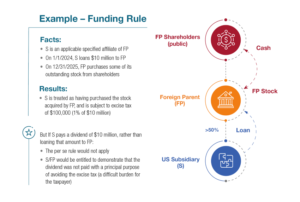Publish Date
May 18, 2023
A&M Tax Advisor Weekly
Many investors who are aware that a new tax applies to stock buybacks by public corporations (including the purchase of stock of a public corporation by its controlled affiliate) may not be aware of the full scope of the tax as enacted by Congress last year and interpreted by the IRS. In particular, publicly traded foreign corporations may not realize that the tax applies to the purchase of their stock by a U.S. subsidiary corporation or partnership. This alert expands on our previous alert regarding the initial guidance in Notice 2023-2 (the Notice) released at the end of last year.
Under the Inflation Reduction Act, a 1% excise tax on share repurchases effective this year generally applies to publicly traded U.S. corporations with annual stock repurchases greater than $1 million, subject to several exceptions. But while the excise tax applies generally to purchases of stock of domestic issuers, the tax may also be imposed on certain purchases of stock of a publicly traded foreign corporation, including:
The purchase of stock of a public foreign parent corporation by its U.S. subsidiary corporation or partnership; and
The purchase of stock of a public foreign corporation that was the acquiring entity in certain “inversion” transactions, by that corporation or an affiliate.
The Notice proposes to expand the scope of repurchases of foreign corporation stock that are subject to the excise tax to include transactions in which a domestic affiliate funds a foreign parent corporation’s acquisition or repurchase of stock with a principal purpose of avoiding the excise tax (the Funding Rule). Further, the Notice provides that a principal purpose of tax avoidance is deemed (per se) to exist if the domestic affiliate provides funding to its foreign parent by any means, other than through distributions, and the parent’s acquisition or repurchase occurs within two years before or after the funding. Funding more than two years before or after a repurchase could still trigger the excise tax if the funding was done with a principal purpose to avoid the tax, but the per se presumption would not apply in such a case.
The following example illustrates the proposed Funding Rule:

A&M Insight: The Funding Rule could significantly expand the application of the excise tax to stock repurchases by foreign-parented groups. Therefore, non-U.S. public corporations should carefully monitor their dealings with U.S. subsidiary entities including identifying any provision of money or property by the subsidiary to its parent, as a distribution, loan, or other transaction. If the foreign parent has received money or property from its U.S. subsidiary in any form, it may want to avoid the purchase of the foreign parent’s stock by any member of the affiliated group (either a corporation or a partnership) from any person outside the group. The phrase “funds by any means” is obviously open to very broad interpretations. In addition to loans and distributions, funding by any means could include cash pooling arrangements and possibly even an intercompany sale of property at an arm’s length price. Foreign parent corporations should also monitor developments in the law, in the form of new legislation, new regulations, or new administrative interpretations. For example, President Biden has proposed, among other things, raising the rate of the tax from 1% to 4%.
According to the Notice, the Funding Rule would apply to repurchases and acquisitions of stock made after December 31, 2022, that are funded on or after December 27, 2022.
A&M Tax SAYS
While anti-abuse rules are not uncommon, the proposed Funding Rule shocked taxpayers and tax advisors alike, as there is no hint of it in the enacted statute. That being the case, the rule may be challenged, but any challenge would be an uphill battle. Therefore, it is important that foreign parent corporations whose stock is traded on any public or private market or exchange consider the potential applications of the rule and monitor their dealings in their own stock, including purchases by any members of their affiliated groups, to manage any exposure to the excise tax. As noted in our earlier alert, the excise tax contains many nuances as to the manner of its application, including the definitions of transactions to which it does or does not apply. If you would like to discuss how the new corporate tax provisions could affect your business and tax planning and implications for transaction modeling, please feel free to reach out to Kevin M. Jacobs or Alan Cathcart.